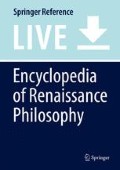Abstract
Margaret Cavendish was a philosopher and writer active in mid-seventeenth century England. She is important not just as one of the first women active in philosophy in early modern age but as the expounder of an original scientific theory based on vitalism and materialism, by which she rejected the mechanical philosophy of Descartes and Hobbes and the experimental philosophy of Boyle and Hooke. Also, while not developing a theory of gender equality, she envisaged a form of emancipation of women based on intellectual activity as a way to social recognition and to the exercise of influence on society and politics.
References
Primary Literature
Cavendish, Margaret. 1653. Philosophicall fancies. London: printed by Tho. Roycroft for J. Martin and J. Allestrye.
Cavendish, Margaret. 2003a [1662]. Orations of divers sorts, accommodated to divers places. In Political writings, ed. Susan James, 111–292. Cambridge: Cambridge University Press.
Cavendish, Margaret. 1664a. Philosophical letters. London: s.n.
Cavendish, Margaret. 1664b. Sociable letters. London: W. Wilson.
Cavendish, Margaret. 2003b [1666]. The description of a new world, called the blazing world. In Political writings, ed. Susan James, 1–110. Cambridge: Cambridge University Press.
Cavendish, Margaret. 1996 [1668]. Grounds of natural philosophy, ed. Michael V. Colette. Cornwall West: Locust Hill Press.
Cavendish, Margaret. 2001 [1666]. Observations upon experimental philosophy, ed. Eileen O’Neill. Cambridge: Cambridge University Press.
Cavendish, Margaret. 2003. In Political writings, ed. Susan James. Cambridge: Cambridge University Press.
Sarasohn, Lisa. 2010. The Natural Philosophy of Margaret Cavendish. Reason and Fancy during the Scientific Revolution. Baltimore: The Johns Hopkins University Press.
Secondary Literature
Battigelli, Anna. 1998. Margaret Cavendish and the exiles of the mind. Lexington: University Press of Kentucky.
Boyle, Deborah. 2006. Fame, virtue, and government: Margaret Cavendish on ethics and politics. Journal of the History of Ideas 67(2): 251–289.
Broad, Jacqueline. 2004. Women philosophers of the seventeenth century. Cambridge: Cambridge University Press.
Cavendish (1623–1673). Project Vox. http://projectvox.library.duke.edu. Accessed 8 Feb 2016.
Cunning, David. 2006. Cavendish on the intelligibility of the prospect of thinking matter. History of Philosophy Quarterly 23(2): 117–136.
Detlefsen, Karen. 2007. Reason and freedom: Margaret Cavendish on the order and disorder of nature. Archiv für Geschichte der Philosophie 89: 157–191.
Digital Cavendish Project. A collaborative independent scholarly project. http://www.digitalcavendish.org. Accessed 8 Feb 2016.
Hutton, Sarah. 1997. In dialogue with Thomas Hobbes: Margaret Cavendish’s natural philosophy. Women’s Writing 4(3): 421–432.
James, Susan. 1999. The philosophical innovations of Margaret Cavendish. British Journal for the History of Philosophy 7(2): 219–244.
Kargon, Robert Hugh. 1966. Atomism in England from Hariot to Newton. New York: Oxford University Press.
Lewis, Eric. 2001. The legacy of Margaret Cavendish. Perspectives on Science 9(3): 341–365.
Margaret Lucas Cavendish. Stanford encyclopedia of philosophy. http://plato.stanford.edu/entries/margaret-cavendish. Accessed 8 Feb 2016.
Michaelian, Kourken. 2009. Margaret Cavendish’s epistemology. British Journal for the History of Philosophy 17(1): 31–53.
Schiebinger, Londa. 1999. Margaret Cavendish, Duchess of Newcastle. In A history of women philosophers. Volume III. Modern women philosophers, 1600–1900, ed. Mary Ellen Waithe, 1–16. Dordrecht: Kluver.
Walters, Lisa. 2014. Margaret Cavendish. Gender, science and politics. Cambridge: Cambridge University Press.
Wright, Joanne H. 2014. Darkness, death, and precarious life in Cavendish’s sociable letters and orations. In God and nature in the thought of Margaret Cavendish, ed. Brandie R. Siegfried and Lisa T. Sarasohn, 43–57. Farnham: Ashgate.
Author information
Authors and Affiliations
Corresponding author
Editor information
Editors and Affiliations
Rights and permissions
Copyright information
© 2016 Springer International Publishing Switzerland
About this entry
Cite this entry
Strazzoni, A. (2016). Cavendish, Margaret. In: Sgarbi, M. (eds) Encyclopedia of Renaissance Philosophy. Springer, Cham. https://doi.org/10.1007/978-3-319-02848-4_471-1
Download citation
DOI: https://doi.org/10.1007/978-3-319-02848-4_471-1
Received:
Accepted:
Published:
Publisher Name: Springer, Cham
Online ISBN: 978-3-319-02848-4
eBook Packages: Springer Reference Religion and PhilosophyReference Module Humanities and Social SciencesReference Module Humanities

